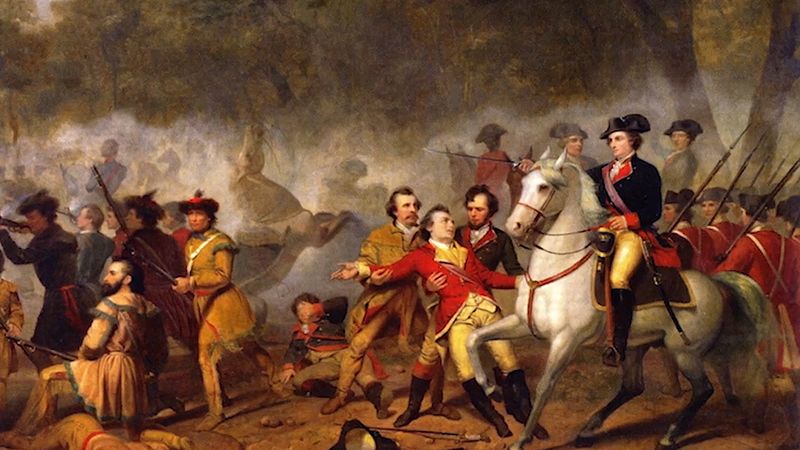World War II started due to various reasons such as the impact of the Treaty of Versailles following WWI, the worldwide economic depression, failure of appeasement, the rise of militarism in Germany and Japan, and the failure of the League of Nations. Another significant factor was the aggression of Fascist Italy against Ethiopia and Imperial Japan against China.
Additionally, Japan’s desire to displace the United States as the dominant Pacific power and acquire the resources of Southeast Asia led to their decision to attack the United States and British forces in Asia. This complex combination of factors ultimately culminated in the outbreak of World War II.
Impact Of The Treaty Of Versailles
World War II started due to multiple factors, one of which was the impact of the Treaty of Versailles on Germany. The harsh terms imposed on Germany after World War I had severe economic consequences and bred resentment among the German people.
The Treaty of Versailles imposed heavy reparations on Germany, crippling its economy and creating widespread poverty. The burden of paying these reparations led to hyperinflation and economic instability.
Moreover, the treaty forced Germany to accept full responsibility for the war, which fueled nationalist sentiments and a desire for revenge. The loss of German territories and military restrictions further exacerbated the resentment.
These economic consequences and the deep sense of injustice among the German population laid the groundwork for the rise of Adolf Hitler and the Nazi Party. Hitler’s aggressive foreign policies and militaristic ambitions eventually sparked World War II.
The Worldwide Economic Depression
The main reason behind World War II was a combination of various factors. One of the major causes was the worldwide economic depression that followed after the stock market crash of 1929. This crash led to a global economic downturn and high unemployment rates. Additionally, the impact of the Treaty of Versailles following World War I played a significant role. The treaty imposed harsh conditions on Germany, which created resentment and allowed for the rise of militarism. Failure of appeasement, the aggression by fascist Italy against Ethiopia and by Imperial Japan against China, and the failure of the League of Nations also contributed to the outbreak of the war. These factors, among others, culminated in the devastating conflict that became known as World War II.
Failure Of Appeasement
| World War 2: Why Did It Start |
| Failure of Appeasement |
|
Policy of appeasing aggressive powers
The failure of appeasement was a significant factor that led to the start of World War 2. Appeasement was the policy of giving in to the demands of aggressive powers in order to avoid conflict. This policy was particularly evident in the case of Nazi Germany under the leadership of Adolf Hitler. |
|
Munich Agreement and its implications
One notable example of appeasement was the Munich Agreement in 1938, where British Prime Minister Neville Chamberlain and French Prime Minister Édouard Daladier agreed to Hitler’s demand to annex parts of Czechoslovakia. This agreement was seen as a way to appease Hitler and avoid war. However, the Munich Agreement had significant implications. It showed Hitler that the Allied powers were willing to make concessions, which further emboldened him to pursue his aggressive expansionist policies. |
Rise Of Militarism In Germany And Japan
World War 2 was caused by a combination of several factors, including the rise of militarism in Germany and Japan. In Germany, Adolf Hitler and the Nazi Party came to power and began a program of rearmament and expansion. Hitler’s aggressive foreign policies, including the annexation of Austria and Czechoslovakia, set the stage for conflict. Similarly, Japan’s imperial ambitions and militarization fueled tensions in the Pacific. Driven by a desire for resources and dominance, Japan attacked the United States and British forces in Asia, leading to the Pacific theater of the war. Other factors, such as the failure of the League of Nations and the impact of the Treaty of Versailles, also contributed to the outbreak of the war.
Failure Of The League Of Nations
World War II started due to various factors, one of which was the failure of the League of Nations. The League of Nations, established after World War I, aimed to maintain peace and prevent future conflicts. However, it had several weaknesses that hindered its effectiveness.
One of the major weaknesses of the League of Nations was its inability to prevent aggression by fascist powers. Countries like Italy under Mussolini and Japan, driven by their expansionist ambitions, engaged in aggressive actions without facing significant consequences from the League. For example, Italy’s invasion of Ethiopia and Japan’s invasion of China were met with little more than condemnation and economic sanctions.
This lack of effective action by the League of Nations allowed these fascist powers to grow stronger and more aggressive, eventually leading to the outbreak of World War II. The failure of the League of Nations to uphold international peace and security highlights the importance of a strong and united global organization in addressing threats to peace.

Credit: www.vanityfair.com
Aggression By Fascist Italy And Imperial Japan
World War II started due to several factors, including aggression by Fascist Italy and Imperial Japan. Fascist Italy, under the rule of Benito Mussolini, invaded Ethiopia in 1935, aiming to establish an Italian empire in East Africa. This invasion was a direct act of aggression and a violation of international law.
Imperial Japan, led by Emperor Hirohito, sought to expand its empire in China and Southeast Asia. The Japanese military carried out numerous invasions and occupations in the region during the 1930s, aiming to secure vital resources such as oil and establish dominance.
These acts of aggression by Italy and Japan were significant catalysts for the outbreak of World War II. They demonstrated the willingness of certain nations to use force to achieve their expansionist goals and challenged the stability of the international order.
Geopolitical Tensions In Europe
Geopolitical tensions in Europe played a significant role in the outbreak of World War 2. Alliances and rivalries among European powers fueled the growing tensions and contributed to the escalation of conflicts. Nationalistic sentiments and border disputes further intensified the situation.
The aggressive moves by Fascist Italy against Ethiopia and Imperial Japan against China added to the factors leading to the war. Additionally, the impact of the Treaty of Versailles following World War I, the worldwide economic depression, and the failure of appeasement also contributed to the outbreak of the war.
Driven by the ambition to displace the United States as the dominant Pacific power and faced with shortages of oil and other natural resources, Japan made the decision to attack the United States and British forces in Asia and seize the resources of Southeast Asia.
Political Ideologies And Propaganda
|
The spread of fascism and Nazi ideology played a significant role in starting World War II. Both Italy, led by Benito Mussolini, and Germany, led by Adolf Hitler, embraced these ideologies and sought to expand their territories and influence. Propaganda was used extensively by these regimes to manipulate public opinion and garner support for their aggressive actions. Through the use of bold and persuasive messaging, they were able to portray their countries as victims in need of expansion to regain lost glory. This propaganda not only targeted their own citizens but also aimed to gain support and sympathy from other nations. It created a sense of inevitability and righteousness in their aggressive actions, making it easier for them to justify their military incursions and conquests. |
Events Leading To The Outbreak Of War
The outbreak of World War II was influenced by a series of events that escalated tensions among countries. One key event was the annexation of Austria and the Sudetenland by Nazi Germany. This expansionist attitude displayed by Germany raised concerns among other nations. Additionally, the German invasion of Poland marked the beginning of the war. Furthermore, other factors leading to the war included the aggression by Fascist Italy against Ethiopia and by Imperial Japan against China.
Faced with severe shortages of oil and other natural resources, Japan decided to attack the United States and British forces in Asia to seize the resources of Southeast Asia. This decision was driven by the ambition to displace the United States as the dominant Pacific power. The major causes of World War II were numerous, including the impact of the Treaty of Versailles following WWI, the worldwide economic depression, failure of appeasement, the rise of militarism in Germany and Japan, and the failure of the League of Nations.
Frequently Asked Questions Of World War 2 Why Did It Start
What Was The Main Reason Behind World War Ii?
The main reason behind World War II was a combination of factors, including the impact of the Treaty of Versailles, worldwide economic depression, failure of appeasement, rise of militarism in Germany and Japan, and the failure of the League of Nations.
Additionally, Japan’s desire for resources led them to attack the United States and British forces in Asia.
Why Did Japan Get Involved In Ww2?
Japan got involved in World War II because of their ambition to displace the United States as the dominant power in the Pacific. They faced shortages of oil and other resources and decided to attack US and British forces in Asia to seize Southeast Asian resources.
What Was The World War 2 In A Nutshell?
World War II was a global conflict that occurred from 1939 to 1945. It was caused by multiple factors, including the impact of the Treaty of Versailles, worldwide economic depression, failure of appeasement, rise of militarism in Germany and Japan, and the failure of the League of Nations.
The war involved numerous countries and resulted in the loss of millions of lives.
Why Did World War 2 Start?
World War 2 started due to various factors such as the impact of the Treaty of Versailles after World War I, the worldwide economic depression, failure of appeasement, the rise of militarism in Germany and Japan, and the failure of the League of Nations.
Conclusion
World War II started due to several factors. The impact of the Treaty of Versailles, the worldwide economic depression, failure of appeasement, the rise of militarism in Germany and Japan, and the failure of the League of Nations all played a role.
Additionally, aggression by Fascist Italy against Ethiopia and Imperial Japan against China escalated tensions. Faced with resource shortages, Japan attacked the United States and British forces in Asia. This devastating war serves as a reminder of the importance of diplomacy and international cooperation in preventing such conflicts.

